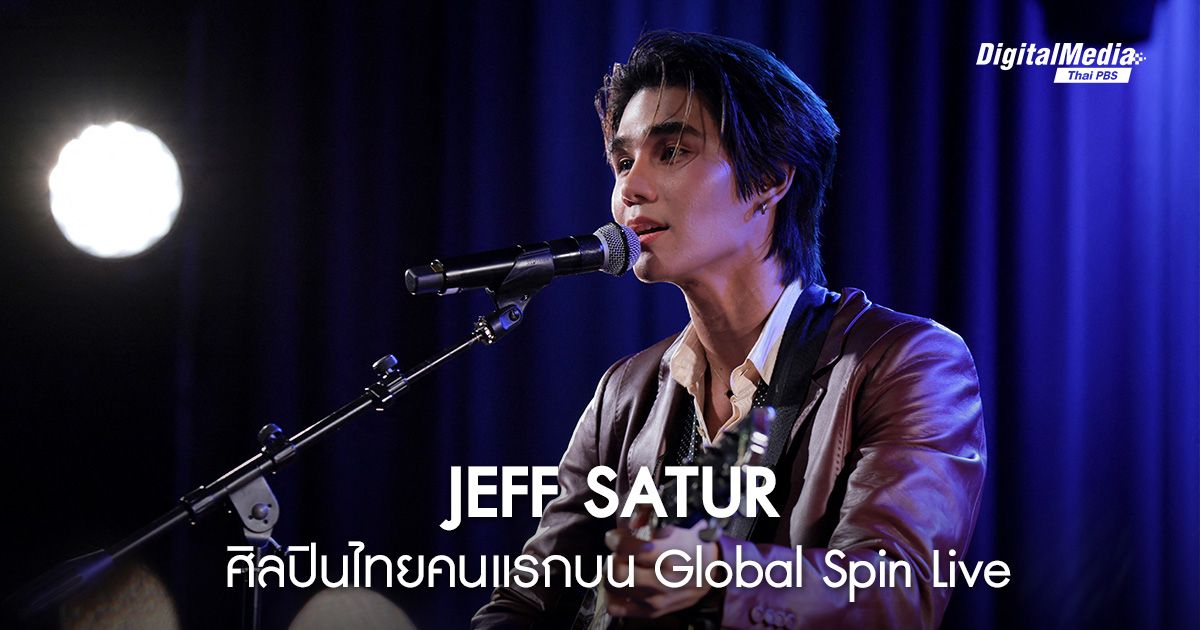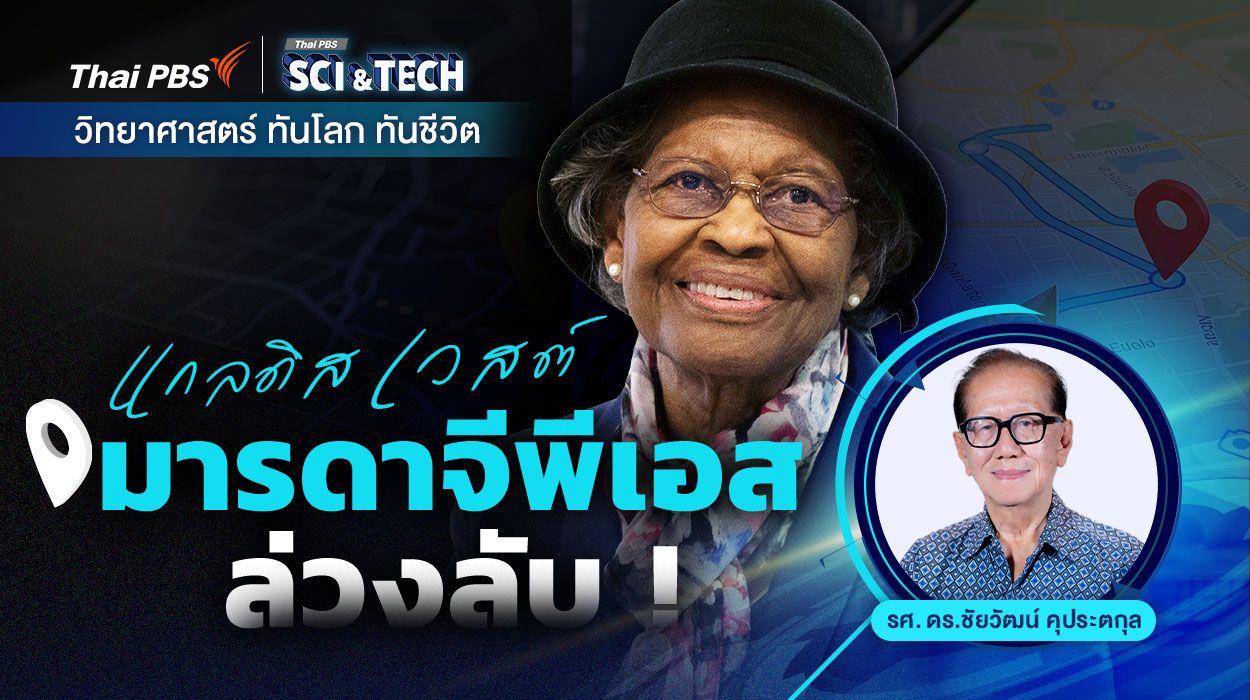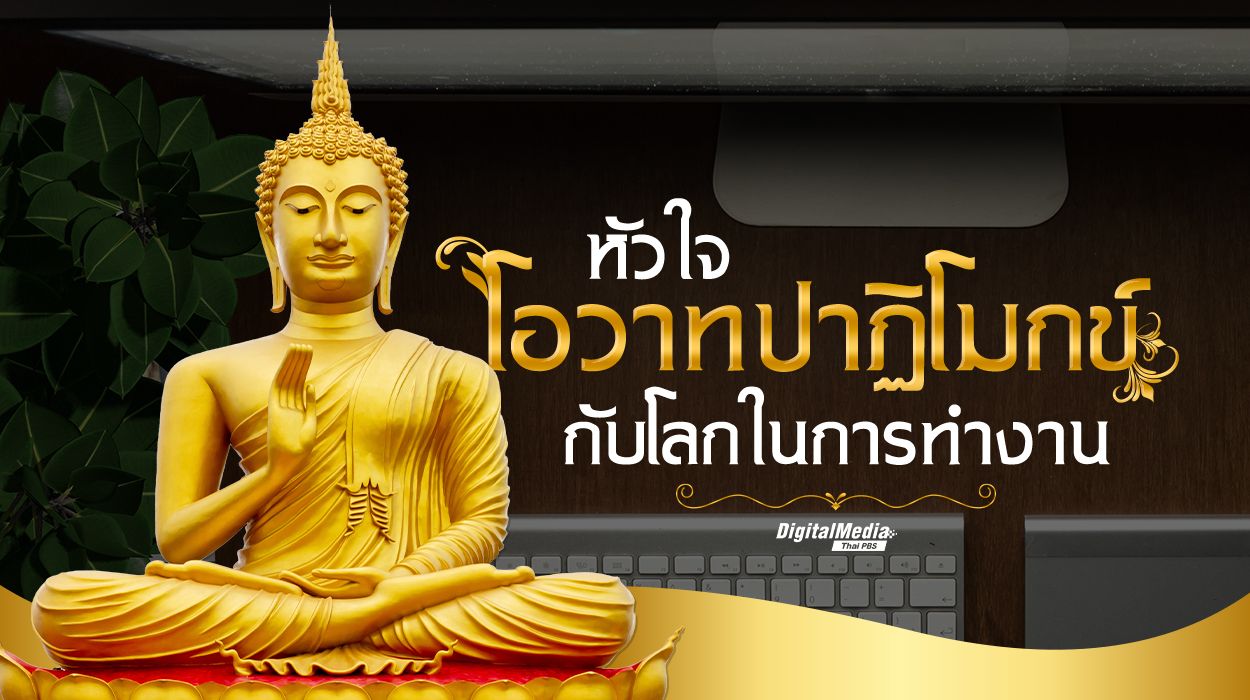ทุกวันนี้ เมื่อพูดถึงซอฟต์พาวเวอร์ไทย หลายคนคงนึกถึงซีรีส์วายหรือ T-Pop ก่อนใครเพื่อน แต่ที่จริงแล้ว ‘วงการนางงาม’ ได้อยู่คู่เมืองไทยก่อนที่คำว่า ‘ซอฟต์พาวเวอร์’ จะเกิดขึ้นในปี ค.ศ. 1990 เสียอีก
Today, when it comes to Thai soft power, BL series and T-Pop may be the first two things that come to mind. In fact, there is another industry which has evolved along with the developments of Thailand even before the term ‘soft power’ was coined in 1990: Thai pageantry. [Scroll down for the English version - เลื่อนลงเพื่ออ่านเวอร์ชันภาษาอังกฤษ]
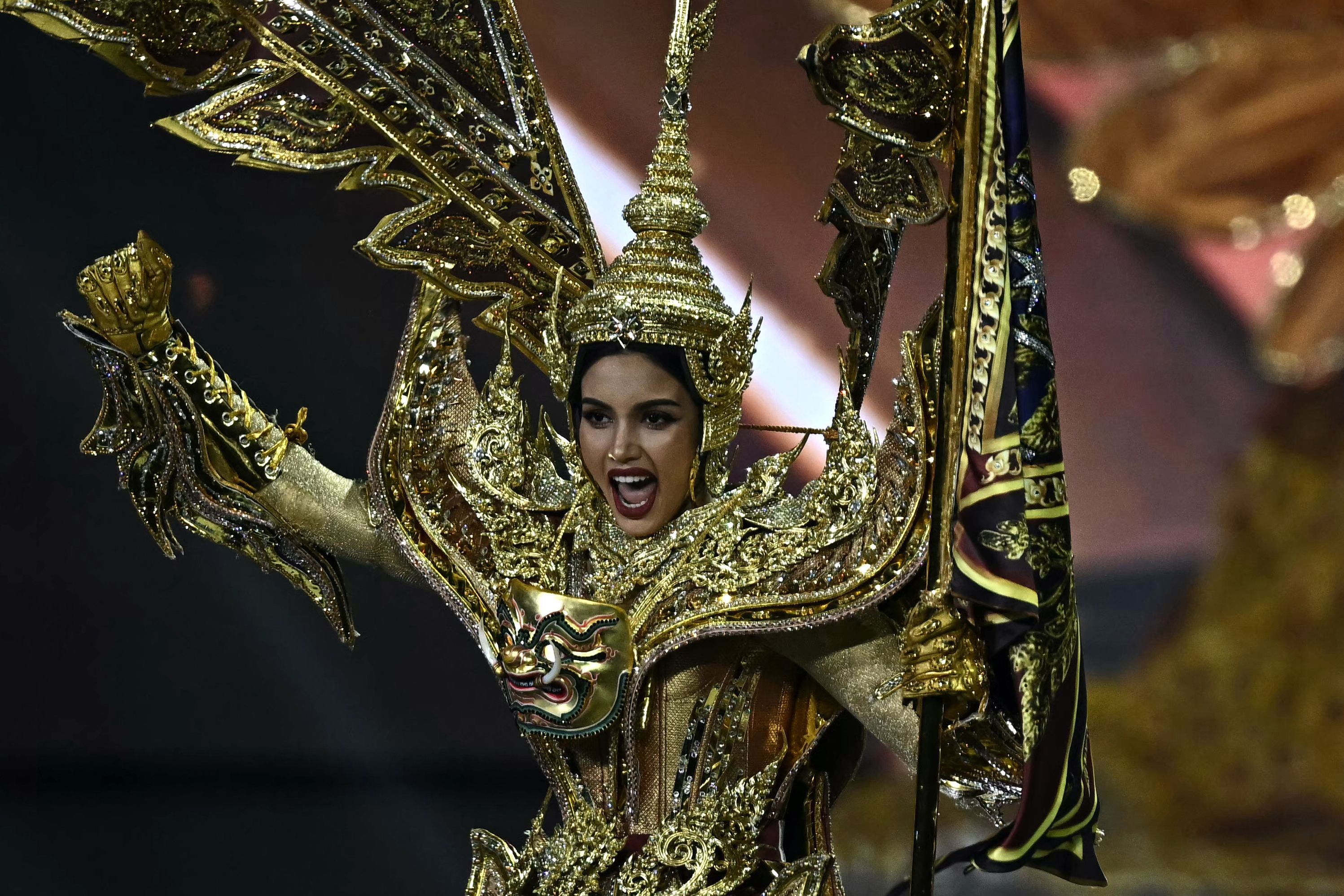
วงการนางงามไทยเกิดขึ้นไล่เลี่ยกับการก่อร่างสร้างตัวของรัฐไทยหลังการเปลี่ยนแปลงการปกครอง ในปี พ.ศ. 2477 (ศ.ศ. 1934) มีการจัดการประกวด ‘นางสาวสยาม’ หรือ ‘นางสาวไทย’ เป็นครั้งแรกเพื่อประชาสัมพันธ์รัฐธรรมนูญและการปกครองแบบประชาธิปไตยอันมีพระมหากษัตริย์ทรงเป็นประมุข นับแต่นั้น วงการนางงามได้เติบโตตามกระแสโลกาวิวัฒน์และเป็นพื้นที่แห่งความหวังให้แก่ผู้หญิง อีกด้านหนึ่ง วงการนางงามไทยและโลกถูกตั้งคำถามมาตลอดว่า “หากิน” กับหญิงสาว ทั้งยังสะท้อนถึงการมีอยู่ของปิตาธิปไตยซึ่งกดทับสตรีไว้
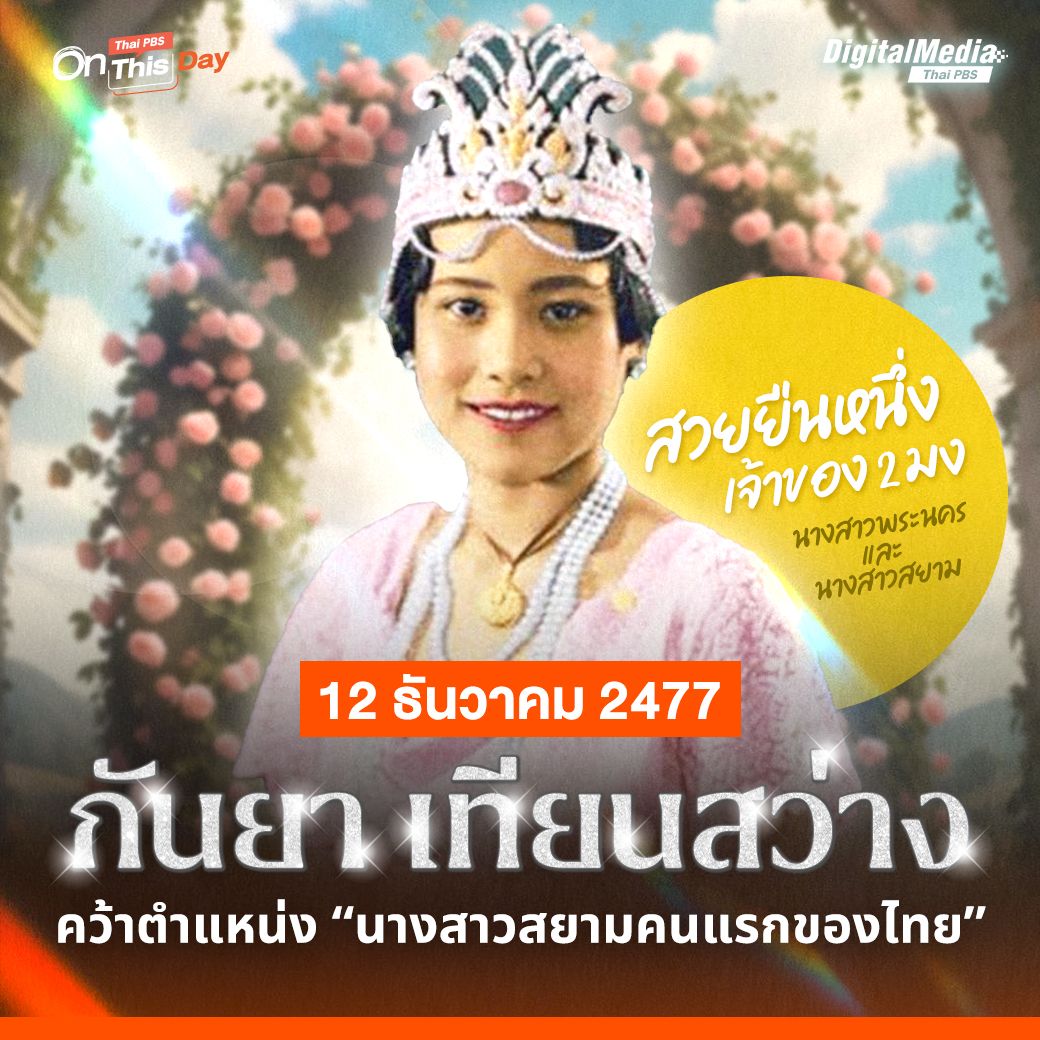
อย่างไรก็ดี ในช่วง 10 ปีที่ผ่านมา วงการนางงามไทยกลับมาเป็นที่สนใจอีกครั้งในระดับมหาชน ไม่ว่าจะเป็นเพราะเหล่าผู้เข้าประกวดที่มีลุ้น “มงลง” ติดต่อกันแทบทุกปีบนเวทีการประกวดระดับโลกต่าง ๆ หรือข่าวการลงทุนในธุรกิจนางงามและความงาม จนอาจทำให้เกิดคำถามว่า ทำไมหลายคนถึงยังคลั่งไคล้นางงาม แล้วเรา – ในฐานะปัจเจก – กับประเทศชาติจะได้อะไรจากวงการนางงาม ในยุคที่สตรีมีอำนาจมากขึ้นในสังคมและแนวคิดเรื่อง ‘ความงาม’ ได้ถูกวิพากษ์และชำแหละไปไม่น้อย ?
“ความชอบธรรมแห่งการมีอยู่” ของวงการนางงามร่วมสมัย
ไม่ว่าจะผ่านไปกี่ยุคสมัย วงการนางงามไทยและสากลมักจะถูกวิจารณ์ว่า ตักตวงผลประโยชน์และกำไรจาก (เรือนร่างของ) ผู้หญิง ปลูกฝังและรักษาชุดความคิดเก่า ๆ เกี่ยวกับสตรี รวมถึงกำหนดบรรทัดฐานความงามต่าง ๆ ขณะเดียวกัน โลกวิชาการไทยช่วง 10 ปีให้หลังก็ศึกษาอุตสาหกรรมนางงามในมิติต่าง ๆ ซึ่งได้ข้อสรุปไปคนละทิศละทาง บ้างกล่าวว่า นางงามเป็นกระบอกเสียงสำคัญในสังคมและมีอำนาจละมุน (soft power) บ้างมองว่า วงการนางงามไทยยังคงติดล่มแนวคิดเดิม ๆ เกี่ยวกับสตรีและความงาม ทั้งยังไม่สามารถเป็นพื้นที่ที่ให้ผู้หญิงสร้างความเปลี่ยนแปลงหรือแสดงความคิดเห็นทางการเมืองได้เต็มที่
ส่วนนักภูมิรัฐศาสตร์และนักปรัชญาการเมืองทั่วโลกได้ตั้งข้อสังเกตว่า วงการนางงามได้รับความนิยมในประเทศ “โลกที่สาม” หรือ “โลกใต้ (Global South)” เช่น ประเทศในเอเชียตะวันออกเฉียงใต้และลาตินอเมริกา เพราะช่วยขับเคลื่อนอุดมการณ์ชาตินิยมและเสรีนิยมใหม่หลังยุคอาณานิคม หรือนักสตรีนิยมส่วนหนึ่งมองว่า การผนวกผู้หญิงเข้าสู่ตลาดเศรษฐกิจนั้นทำให้ผู้หญิงมีที่ทางมากขึ้นจริง แต่ก็ตีกรอบบทบาทและความงามของผู้หญิงเอาไว้ด้วยตามบริบทของแต่ละประเทศ และวงการนางงามก็ไม่ใช่ข้อยกเว้น แค่คำถามเพียงเท่านี้ก็บ่งบอกถึง “ความย้อนแย้ง” ที่เกิดขึ้นในวงการนางงาม จนทำให้บางคนอาจปฏิเสธวงการนี้ในปัจจุบัน
“เราก็จะเห็นว่า [เวทีการประกวดนางงาม] มีความย้อนแย้งอยู่ในตัวนะ หลาย ๆ คนโดยเฉพาะอย่างยิ่ง กลุ่มนักเคลื่อนไหวก็จะเชื่อว่า [การประกวดนางงาม] ต่อต้านชุดคุณค่าสตรีนิยม อาจจะทำให้ผู้หญิงเป็นสินค้า อาจจะเกิดการข่มเหง [ผู้หญิง] ฯลฯ” อ.ฐิติพงษ์ ด้วงคง (อ.ธง) ผู้เชี่ยวชาญการประกวดนางงาม และอาจารย์พิเศษวิทยาลัยนานาชาติปรีดีพนมยงค์ มหาวิทยาลัยธรรมศาสตร์ กล่าวถึงความย้อนแย้งซึ่งมีอยู่ “จริง” ในวงการนางงาม “แต่ในขณะเดียวกันเราไม่สามารถฟังเสียงคนกลุ่มนี้ได้อย่างเดียว เราต้องฟังเสียงกลุ่มที่เป็น ‘agents (ผู้กระทำ)’ ก็คือตัวนางงามเองด้วยว่า ทำไมถึงเข้ามาเป็นส่วนหนึ่งของกระบวนการนี้”
เช่นนี้แล้ว คนในวงการนางงาม – โดยเฉพาะผู้จัดการประกวดและผู้เข้าประกวด – จึงต้องพิสูจน์ “ความชอบธรรมในการดำรงอยู่ (raison d’être)” ของวงการนี้ผ่านการโอบรับคนทุกกลุ่ม (inclusivity) และการทลายข้อจำกัดด้านอายุและสถานะของผู้สมัครในบางเวทีเพื่อทำให้ผู้คนเห็นว่า วงการนางงามส่งเสริมผู้หญิงได้จริงและยึดโยงกับค่านิยมต่าง ๆ ที่เปลี่ยนไปตามกาลเวลา

“ตัวอย่าง กรณีของอาร์บอนนี แกเบรียล (R’Bonney Gabriel - ผู้ชนะ Miss Universe 2022) ตัวเธอเคยมีข้อจำกัด [ด้านอายุ] ในการเข้ามาประกวด เพราะเป็นนางงามจักรวาลที่อายุเยอะที่สุด แต่เธอมาประกวดแล้วสามารถทลายกำแพงนี้ได้ [เธอพูดว่า] “ถ้าไม่ทำตอนนี้แล้วจะทำตอนไหน (If not now, then when?)’ [ดังนั้น] นางงามสามารถใช้เสียงตัวเองถามสังคมกลับไปได้ และทำให้เห็นว่า ที่เธอยืนอยู่ตรงนี้ เธอกำลังทำมันได้ อันนี้เริ่มเป็นสารของผู้หญิงที่มาประกวดนางงาม” อ.ธง ให้สัมภาษณ์กับ Thai PBS “เมื่อเวทีใหญ่เปิดโอกาสให้ผู้หญิงที่มีอายุมากขึ้นประกวดได้ มันก็เพิ่มกำลังใจและความกล้าในใจของผู้หญิง ค่อย ๆ ทำให้สิ่งที่เคยถูกจำกัดเอาไว้ลดน้อยถอยลง”
กลับมาที่ไทย หลังจากที่ Miss Universe เวทีแม่ปลดล็อกข้อจำกัดอายุสูงสุด พร้อมเปิดรับหญิงข้ามเพศ กับหญิงที่แต่งงานและ/หรือมีลูกแล้วให้มาสมัครการประกวดได้ ทำให้ “คนเป็นแม่” เข้ามาทำตามความฝันและสร้างแรงบันดาลใจให้บุตรหลานของตัวเอง เช่น ซาร่า คาซิงกินี นักแสดงที่เข้าประกวดเวที Miss Universe สมุทรสาคร-บึงกาฬ 2025 ในวัย 38 ปี หรือ แอมมี่-สุนีพร เจริญชัย ที่มีบุตรแล้ว 2 คน ก็มาประกวดในเวทีเดียวกัน
อ.ธง ยังกล่าวว่า เวทีการประกวดนางงามจะยังทำหน้าที่เป็น “แพลตฟอร์ม” ให้ผู้หญิงได้สื่อสารถึงประเด็นต่าง ๆ ต่อไป ซึ่งตรงกับคำพูดของโอปอล-สุชาตา ช่วงศรี Miss World 2025 ที่เคยกล่าวในรายการ The Inspirer เมื่อเดือน ก.พ. 68 ว่า “มันจะต้องมีบางสิ่งบางอย่างที่ต้องถูกพูดออกมาให้ดังขึ้น ซึ่งจะเกิดขึ้นโดยผู้หญิงเหล่านี้ที่มีแพลตฟอร์ม มีเสียงที่ดังและมีผู้ที่ฟังเขา ไม่ว่าในอนาคตจะเกิดเรื่องอะไรที่ต้องได้รับการพูดถึงหรือทำให้ถูกต้องในสังคม นี่คือส่วนหนึ่งที่ผู้หญิงเหล่านี้จะทำให้สังคมได้”
นอกจากนี้ เวทีประกวดนางงามสามารถส่งต่อแรงบันดาลใจ พร้อมกับสร้างโอกาสให้คนตัวเล็กหรือคนชายขอบในสังคม เช่น แอนนา เสืองามเอี่ยม ผู้ดำรงตำแหน่ง Miss Universe Thailand 2022 ที่ใช้เวทีนางงามลบล้างอคติเกี่ยวกับ ‘พนักงานเก็บขยะ’ อาชีพที่บิดามารดาของแอนนาทำ “นางงามจากกองขยะ หมายความว่า คุณพ่อคุณแม่ทำงานเกี่ยวกับขยะ ส่งเราเรียนจนประสบความสำเร็จแล้ว มันรู้สึกภูมิใจ... เราจะยินดีมาก ๆ ที่ใครได้ยินสิ่งที่เราพูดหรือได้ฟังคำว่า ‘นางงามจากกองขยะ’ แล้วเขามีแรงฮึดสู้ มากกว่าฟังแล้ว ‘โห ชีวิตแอนนามันดรามามาก’” แอนนาเล่าในรายการ Made My Day วันนี้ดีที่สุด เมื่อเดือน ส.ค. 67
วงการนางงามไทย ซอฟต์พาวเวอร์และโมเดลธุรกิจที่ “มาก่อนกาล”
แม้จะถูกวิพากษ์วิจารณ์มากเพียงใด ก็ไม่อาจปฏิเสธได้ว่า วงการนางงามไทยผูกติดกับการเมืองและการพาณิชย์มาตั้งแต่เริ่ม อย่างเช่นเวที ‘นางสาวสยาม’ ที่เกิดขึ้น 2 ปีหลังการปฏิวัติสยาม เพื่อสื่อสารและสร้างความเข้าใจให้แก่ประชาชนถึงระบอบการปกครองใหม่ หรือปี พ.ศ. 2508 (ค.ศ. 1965) อาภัสรา หงสกุล ได้เป็น Miss Universe คนแรกของไทยและคนที่ 2 ของเอเชีย ในปีเดียวกันนั้น รัฐบาลไทยยินยอมให้กองทัพสหรัฐฯ ปรับปรุงและใช้งานสนามบินอู่ตะเภาเป็นฐานทัพ อีกทั้งหากปีใดมีนางงามชนะเวทีระดับโลก ก็จะได้รับการขนานนามว่าเป็น “ฮีโร่ของประเทศ” ไม่ต่างจากนักกีฬาทีมชาติ ซึ่งสะท้อนถึงแนวคิดชาตินิยมได้ในทางหนึ่ง
วงการนางงามไทยก็เคยมีช่วง “ขาลง” เหมือนกัน ส่วนหนึ่งมาจากอัตราการเข้ารอบลึก ๆ ของผู้เข้าประกวดไทยบนเวทีนางงามโลกที่ลดลง แต่ความหวังในการเชียร์นางงามไทยกลับมาอีกครั้งในปี พ.ศ. 2558 (ค.ศ. 2015) “แนท-อนิพรณ์ [เฉลิมบูรณะวงศ์] สามารถทะลุเข้ารอบในการประกวด Miss Universe ได้หลังจากที่ [วงการนางงามไทย] แห้งแล้งมานาน” อ.ธง เล่าย้อนกลับไป “ประกอบกับ 10 ปีที่ผ่านมา อัตราการใช้อินเทอร์เน็ตและโซเชียลมีเดียของไทยก็ค่อย ๆ ก่อตัวขึ้น เกิดชุมชนเสมือน (virtual communities) ขึ้น เช่น เว็บบอร์ดนางงาม”

พอกระแสการเชียร์นางงามกลับมา อีกทั้งชาวบ้านประชาชนได้กลายเป็น ‘ชาวเน็ต (netizens)’ คนกลุ่มหนึ่งที่มีทั้งความคลั่งไคล้นางงาม องค์ความรู้ และเงิน ก็เห็นศักยภาพทางธุรกิจและลงทุนในวงการนางงามแบบ “ครอบจักรวาล” ผ่านการจัดประกวด การหาสปอนเซอร์ ธุรกิจฝึกสอนนางงาม การขายสินค้าตั้งแต่น้ำพริกไปจนถึงเซรั่มบนโลกออนไลน์ การเป็นผู้จัดการนางงาม การทำคอนเทนต์ ฯลฯ ทั้งหมดนี้นำมาสู่ “วัฒนธรรมการเชียร์นางงามแบบต้องกดตระกร้า” ตามคำนิยามของ อ.ธง และจากมุมมองส่วนตัวของ อ.ธง นั้น ‘โมเดลธุรกิจอิงฐานแฟนคลับ (fan-based)’ ในไทยก็เริ่มมาจากวงการนางงาม ก่อนที่ซีรีส์วายจะทำให้กลยุทธ์นี้โด่งดัง “[และ] เศรษฐกิจสร้างสรรค์มันเติบโต ส่วนหนึ่ง – ผมกล้าพูดได้เลยว่า – มาจากวัฒนธรรมการประกวดนางงาม”
ขณะที่หลายคนยังคงมองว่าวงการนางงามกดทับบทบาทของสตรี วงการนางงามยุคดิจิทัลดูจะสร้างอาชีพ (professionalization) ให้ผู้หญิง จึงไม่น่าแปลกที่นางงามไทยยุคนี้มีบทบาทไหลลื่นและเป็นอะไรก็ได้ทั้งในโลกออนไลน์และออนกราวด์ ณวัฒน์ อิสรไกรศีล ผู้ก่อตั้งและประธานเวที Miss Grand International เรียกคุณสมบัติของนางงามแบบนี้ว่า “ผู้หญิงพร้อมใช้” ในความหมายด้านบวก ในรายการไทยบันเทิงเมื่อเดือน ส.ค. 65 “คำว่า ‘ผู้หญิงพร้อมใช้’ หมายความว่าเราเป็นบุคคลสาธารณะ อะไรที่ทำให้คนทั่วไปมาหลงรักคุณ ชอบคุณ สนับสนุนคุณ และทำให้คุณกลายเป็นที่ยึดเหนี่ยวบางอย่างที่ทำให้คนทั่วไปได้มีความสุข อันนี้สำคัญมาก”
ยิ่งไปกว่านั้น การสร้างอาชีพผ่านเวทีประกวดนางงามในปัจจุบันยังเปิดโอกาสให้ผู้หญิงเรียนรู้ทักษะใหม่ ๆ พร้อมลงมือทำจริงทันที โดยเฉพาะกระแสดิสรัปชันและโควิด-19 ได้ผลักให้นางงาม “ออกกล้อง” แทบทุกวัน “ต่อให้เราบอกว่านางเป็น ‘คนขายของ’ แต่ว่านางงามก็เรียนรู้ทักษะมากมาย ซึ่งมันเป็นสกิลติดตัวนางงาม แล้วดีกว่าไปเรียนในโรงเรียนธุรกิจใด ๆ เสียอีก เพราะว่าคุณได้สัมผัสและเรียนรู้กับกลุ่มเป้าหมายที่เปลี่ยนไปทุกวัน” อ.ธง กล่าว และการพัฒนาตัวเองแบบนี้ก็อาจทำให้นางงามกลายเป็น “ผู้ประกอบการ” ได้ในวันข้างหน้า
นี่จึงตอบคำถามได้ในระดับหนึ่งว่า ทำไมประเทศไทยถึงมีเวทีประกวดนางงามหลายแห่ง และเหตุใดผู้หญิงจำนวนไม่น้อยยังคงเห็นความสำคัญและสนใจขึ้นเวทีนางงามสักครั้ง อย่างไรก็ตาม ความเฟื่องฟูทางธุรกิจเช่นนี้ก็อาจกลบความสำคัญทางรัฐศาสตร์และพหุวัฒนธรรมที่แฝง (และถูกมองข้าม) อยู่ในวงการนางงามมาเนิ่นนาน
“การสร้างพลเมืองไทยสู่พลเมืองโลก” มิติที่คนไทยและรัฐไทยอาจมองข้ามเกี่ยวกับวงการนางงาม
ตลอดเวลาหลายทศวรรษ รัฐไทยยอมรับและชื่นชมนางงามผู้สร้างชื่อเสียงให้ประเทศชาติ (และอย่าลืมว่า วงการนางงามไทยเกิดขึ้นด้วยเหตุผลทางการเมือง) ทว่าในเชิงนโยบาย รัฐยังไม่มีมาตรการและแนวทางส่งเสริมวงการนางงามไทยมากนักเมื่อเทียบกับซอฟต์พาวเวอร์ด้านอื่น ๆ “ถ้าคุณพูดถึงนโยบาย ‘5F’ [การต่อสู้ (Fight), ภาพยนตร์ (Film), อาหาร (Food), เทศกาล (Festivities), แฟชั่น (Fashion)] ผมอยากให้พูดถึง ‘Pageantry’ หรือนางงามด้วย เพราะ Pageantry สามารถสร้างแรงกระเพื่อมได้ได้แบบไม่แพ้ตัวอื่น ๆ” อ.ธง เสริมความ
อ.ธง มองว่า เป็นเรื่องดีแล้วที่เอกชนเป็นตัวหลักในการดำเนินกิจการนางงาม “แต่รัฐ [สามารถ] ช่วยอำนวยความสะดวกในการเปิดพื้นที่ ให้ความปลอดภัย หรือลงเงินสนับสนุนได้ไหม เพื่อนำมายึดโยงกับภาคการท่องเที่ยวที่อาจจะอยู่ในช่วงขาลงอยู่ตอนนี้” นอกจากนางงามจะทำหน้าที่เป็นทูตเชิงวัฒนธรรมและการท่องเที่ยวได้ ตัววงการนางงามเองก็เป็นจุดหลอมรวม (melting pot) ของสรรพศาสตร์ ทั้งเพศ เศรษฐกิจ วัฒนธรรม ปรัชญา การทูต การเมือง ประวัติศาสตร์ ฯลฯ ซึ่งหากต่อยอดได้ดี ก็เป็นประโยชน์ต่อความสัมพันธ์ระหว่างประเทศได้
อันที่จริง การต่อยอดที่ว่านี้เกิดขึ้นบ้างแล้วบนเวทีนางงามและแวดวงวิชาการ เช่น เมื่อ 2 ปีก่อน แอนโทเนีย โพซิ้ว ตัวแทนจากไทยบนเวที Miss Universe 2023 ที่เอลซัลวาดอร์ ได้กลายเป็นไวรัลหลังจากแนะนำตัวเป็นภาษาสเปนว่า “¡Hola Universo!” จนทำให้ชาวเน็ตค้นหาข้อมูลเกี่ยวกับเอลซัลวาดอร์และภาษาสเปนเพิ่มขึ้น และในปี พ.ศ. 2564 คณะอักษรศาสตร์ จุฬาลงกรณ์มหาวิทยาลัย ได้เปิดคอร์สออนไลน์ ‘ภาษาสเปนและการนางงาม’ ซึ่งเป็นการเรียนการสอนในรูปแบบมีประเด็นเป็นฐาน (theme-based) และอาจเป็นแนวทางสำคัญในการพัฒนาทักษะภาษาต่างประเทศและความเข้าใจทางพหุวัฒนธรรมของคนไทย
คนที่มาเรียนภาษาสเปนและการนางงามที่ผมเคยสอน ทุกคนมีเป้าหมายเดียวกัน คือเรื่อง ‘ความงาม’ เพื่อเอาไว้ดูนางงาม มันคือ ‘beauty with a purpose [ความสวยงามที่มาพร้อมวัตถุประสงค์]’ ซึ่งเป็นการเรียนที่ตอบโจทย์มาก ! และ [การเรียนการสอนบนพื้นฐานของสิ่งที่ผู้เรียนสนใจ] คือวิธีการเรียนที่ถูกต้องและมีประสิทธิภาพซึ่งได้รับการวิพากษ์กับผ่านกระบวนการวิจัยแล้ว - ฐิติพงษ์ ด้วงคง (อ.ธง) ในฐานะผู้สอนคอร์ส ‘ภาษาสเปนและการนางงาม’
“ผมรู้สึกขอบคุณวงการนางงามมากที่ทำให้มัน [ภาษาสเปนและการนางงาม] เกิดขึ้น แล้วผมก็นำสิ่งนี้มาใช้ฝึกแอนโทเนีย โพซิ้วอีกทีหนึ่ง และหลังจากแอนโทเนียพูดว่า ‘¡Hola Universo, hola El Salvador!’ ก็กลับไปสู่ [วัฒนธรรม] ชาวเน็ตร่วมกัน แชร์ร่วมกัน โควตร่วมกัน แปลร่วมกัน ศึกษาร่วมกัน” อ.ธง เล่าต่อ "นำมาสู่การเพิ่มความรู้ด้านภูมิรัฐศาสตร์ด้วยว่า ประเทศเอลซัลวาดอร์อยู่ที่ไหน ประธานาธิบดีที่สนับสนุนการประกวดนางงามเพื่อส่งสารว่า ‘เอลซัลวาดอร์โมเดิร์นและปลอดภัยนะ’ เป็นใคร… คือบูเคเล [Nayib Bukele]"

ไม่เพียงแต่วงการนางงามจะมีความย้อนแย้งอย่างที่อธิบายไว้ก่อนหน้า แต่ “คนดู” อย่างเรา ๆ ก็มีความย้อนแย้งในตัวเองด้วยเช่นกัน “กล่าวคือ เราวิจารณ์และวิพากษ์วงการนางงาม แต่เราก็มีส่วนร่วมในการสนับสนุนการประกวดนางงามผ่านยอดวิวด้วยในเวลาเดียวกัน” จิตวัต กันยะมูล – นักลาตินอเมริกันศึกษาและผู้เขียนบทความวิจัยเกี่ยวกับคอร์ส ‘ภาษาสเปนและการนางงาม’ บนวารสารวิชาการ Publicaciones ของสเปน ร่วมกับ อ.ธง และ ผศ.ดร.เพ็ญพิสาข์ ศรีวรนารถ อาจารย์ประจำสาขาวิชาภาษาสเปน จุฬาลงกรณ์มหาวิทยาลัย – ให้สัมภาษณ์กับ Thai PBS กระนั้นก็ดี หากเราตระหนักความย้อนแย้งที่ว่านี้ได้ ก็จะทำให้เราพัฒนากระบวนการคิดเชิงวิพากษ์ (critical thinking) ไปในตัว อีกทั้งไม่จำเป็นต้องมองว่า ชอบอะไรอย่างหนึ่งแล้วจะแตะหรือวิจารณ์ไม่ได้เลย
“เราอาจมองการประกวดความงามในฐานะที่เป็นพื้นที่ที่องค์ความรู้ อารมณ์ และคุณค่าหลากหลายแบบหลายชุดของผู้ผลิต ผู้เข้าประกวด สื่อ และผู้เสพ จากหลายชนชั้น วรรณะ เพศ หรือความแตกต่างในมิติต่าง ๆ มาคัดง้างและต่อรองอำนาจกัน” จิตวัตเสริม และในมุมมองของจิตวัต “ความสวย” ของนางงามอยู่ที่ “การจัดระเบียบและนำเสนอความคิดต่าง ๆ อย่างทรงพลังให้ผู้ชมเห็น” เช่น เวที Miss Peru 2017 แทนที่จะแนะนำสัดส่วนรูปร่าง ผู้เข้าประกวดชื่อกามิลา กานิโกบา (Camila Canicoba) กลับแนะนำสัดส่วนของตัวเองด้วยจำนวนผู้หญิงที่ถูกฆาตกรรมในเปรู หรือซาแมนตา บาตายาโนส (Samantha Batallanos) ที่กล่าวถึงสัดส่วนของเธอว่าเป็น “จำนวนเด็กผู้หญิงที่ถูกฆ่าตายทุก 10 นาทีจากการล่วงละเมิดทางเพศ” เวทีนางงามจึงเป็นมากกว่าพื้นที่ประชันความสวย

ที่สำคัญที่สุด วัฒนธรรมนางงามทำให้เกิดความเข้าใจและการเชื่อมโยงระหว่าง “เรา” และ “เขา (the Other)” ซึ่งช่วยเปิดทางให้สำนึกความเป็น ‘พลเมืองโลก’ เกิดขึ้นได้ อย่างที่จิตวัตเล่าให้ Thai PBS ฟังถึงประสบการณ์ในนครลอสแอนเจลิสเมื่อปี พ.ศ. 2567 ที่เจ้าตัวได้พบเจอกลุ่มผู้ประท้วงชาวนิการากัวที่รวมตัวกันในใจกลางนครลอสแอนเจลิสเพื่อแสดงจุดยืนต่อต้านรัฐบาลของเดเนียล ออร์เตกา (Daniel Ortega) ประธานาธิบดีเผด็จการของนิการากัว
“พอเราพูดว่าเราเป็นคนไทย คนนิการากัวที่ประท้วงก็… ‘เฮ้ย ! คนไทยเหรอ ที่ได้ Miss Universe รองอันดับ 1 [เมื่อปี 2023] ส่วนนิการากัวได้อันดับ 1 ดีใจด้วยนะ’ เหมือนการประกวดนางงามมาทำให้พวกเรา ‘unite’ เป็นหนึ่งเดียวกัน มี ‘solidarity’ หรือสำนึกความเป็นปึกแผ่นอะไรบางอย่างในหมู่คนดูนางงาม...” จิตวัตย้อนไปถึงเหตุการณ์ครั้งนั้น
แม้หลายครั้ง เราจะเห็นแฟนนางงามแต่ละชาติออกมาฟาดฟันกัน [เมื่อถึงคราวประกวด] แต่ในบริบทที่เราไปเจอแฟนคลับครั้งนั้น มันก็ทลายพรมแดน [ทำให้เห็น] การเมืองและความรุนแรงทางการเมืองของประเทศอื่นที่อาจจะเหมือนกับเราผ่าน ‘ชุมชนคนดูนางงาม’ - จิตวัต กันยะมูล
แม้บางคนอาจจะคิดว่า “ฉาบฉวย” หรือ “ไร้สาระ” แต่วงการนางงามกลับเต็มไปด้วยประวัติศาสตร์ เรื่องราว ไปจนถึงอุดมการณ์ชาติและความย้อนแย้งมาตั้งแต่แรกเริ่ม และจากทั้งหมดที่กล่าวมา คงจะพอทำให้เราเห็นว่า การประกวดนางงามจะยังคงอยู่ต่อไปพร้อมกับต้องปรับตัวตามสังคมโลก ขณะที่คนเชียร์นางงามเองก็สามารถพัฒนาตัวเองและสร้างประโยชน์จากความหลงใหลเช่นนี้ได้เช่นกัน กล่าวอีกนัยหนึ่ง เรื่องนางงามและความงามเกี่ยวข้องกับพวกเราทุกคนในทางใดทางหนึ่ง หาใช่เป็นเรื่องของ “ผู้หญิงเท่านั้น” อย่างที่หลายคนเข้าใจ

ไทยพีบีเอส เขียนอังกฤษให้ไทยอ่านผ่านบทความ 2 ภาษา พร้อมเรื่องราวที่คุณอาจสนใจ
- ‘นิราศสงกรานต์’ ของเด็กไทยที่เคยอยู่ใน ‘กรีซ’ | A Songkran Story in Thessaloniki
- เมื่อปัญหา ‘สแกมเมอร์’ กัดกินอาเซียน | When Cyber Scam Operation Ravage ASEAN
- ‘น้ำหอมไทย’ กับอนาคตอันแสนหอมหวาน ? | The (Promising) Future of Thai Perfumes
ขอขอบคุณ: ฐิติพงษ์ ด้วงคง, จิตวัต กันยะมูล และ นฤสิริ เชาวน์ฤทธิ์
พิสูจน์อักษร: นวพร เรืองศรี
ภาพปก: AFP (สุชาตา, แอนนา และอนิพรณ์), Facebook TPN Global (แอนโทเนีย), Facebook Red Sea International Film Festival (อิงฟ้า วราหะ)
ติดตามเรื่องราวและบทความทันทุกกระแสที่ Thai PBS NOW: www.thaipbs.or.th/now
The first Thai beauty pageant called ‘Miss Siam’ (later known as Miss Thailand) was held in 1934, two years after the Siamese Revolution, to build awareness of the constitution and the constitutional monarchy among the Thais. Since then, Thai pageantry has grown amid globalization, serving as a space of endless opportunities for women. On the other hand, both Thai and international beauty pageants have been questioned as to whether they exploit young girls while representing patriarchy over women.
Over the last 10 years, Thai beauty pageants have anyhow gained massive public attention. Thai contestants are more competitive on the international stage as more investments go into pageantry and relevant beauty businesses. But the questions remain. Why are some people “obsessed” with these beauty competitions? What do we – as individuals and as a nation – get from beauty pageants as more women gain power in society and the idea of ‘beauty’ has been discussed and dissected to some extent?
Raison d’être of the present-day pageantry
Both Thai and international beauty pageants have been criticized for exploiting women and their bodies, protecting “traditional ideas” of being “female,” and standardizing beauty. As for Thai academia over the last decade, there are studies on pageantry with polarized conclusions. Some say that beauty queens are voices of society, acting as ‘soft power’ agents. Some argue that Thai beauty contests are still trapped in traditional concepts of femininity and beauty, failing to serve as platforms for women to make real changes or be able to politically speak up.

Globally, some geopolitical academics and political philosophers have noted that beauty pageants are popular in third-world countries, or the “Global South,” such as those in Southeast Asia and Latin America. It has been argued that those pageants intensify nationalism and neoliberalism in the age of post-colonialism. In feminist theorists’ opinions, the inclusion of women in the economy does uplift female lives, but it also sets limits on women’s role and beauty. And beauty pageants are no exception. Thus, these questions show “contradictions” in these beauty contestants, hence the rejection of pageantry among some people.
Interviewed by Thai PBS, Thitipong Duangkong, a beauty pageant expert and adjunct professor at Thammasat University, said that contradictions do exist in pageantry: “As we may notice, [beauty pageants] are contradictory. Many people, particularly social activists, believe that [these pageants] run against feminist values, by abusing women and turning them into merchandise.” He continued: “At the same time, we cannot only listen to the activists; we must ask the beauty pageant contestants, as ‘agents’, why they have decided to be part of pageantry.”

In this way, present-day beauty pageants must find their ‘raison d’être’ through, for instance, a promotion of inclusivity and revocation of age and marital status restrictions on contestants. This is to justify that pageantry can empower women and remain relevant to the modern world.
Miss Universe 2022 winner R’Bonney Gabriel might reflect such change: “She used to struggle with [age] discrimination while applying in the competition. Eventually, she became the oldest entrant to win the title. ‘If not now, then when?’ [Therefore,] beauty pageant titleholders and contestants can ask questions back to the society, making a point that’ yes, women can’. This is becoming an important message of women competing in beauty pageants.” Thitipong later added: “As major beauty pageants allow older women to compete, it encourages women and constantly demolishes all the limits.”

In Thailand, after the main Miss Universe had lift restrictions on eligibilities, welcoming trans women, married women and those with children to compete, actress/model/mother Sarah Casinghini and mother-of-two Suneephorn “Ammy” Charoenchai took part in 2025 Miss Universe Samutsakhon & Buengkan a few months ago. This might reflect a significant shift in the modern Thai pageantry.
Also, Thitipong thought that beauty pageants would continuously serve as “platforms” for women to address issues in the community. This coincides with the opinion of Suchata “Opal” Chuangsri, the titleholder of Miss World 2025.
Some issues must be voiced by women on [these] platforms where their voices will be heard. Addressing no matter what issue needing attention and justice is one way these women can contribute to the society. - Suchata Chuangsri, interviewed in a Thai PBS program in 2025

Moreover, beauty pageants can inspire and give opportunities to oppressed or marginalized women. Miss Universe Thailand 2022 winner Anna Sueangam-iam is one of those women: her parents are public garbage collectors, a career that some people look down on. However, Anna made the most of her participation in the competition to fight such bias. “I am a ‘beauty queen from rubbish.' Thanks to my parents' job as public garbage collectors, I was able to go to college and accomplish my dreams,” Anna said in a Thai PBS program in August 2024. “I am proud… and I will be so welcome if someone is inspired by hearing my story or the term ‘beauty queen from rubbish’. Not that they think ‘poor girl, Anna’s life is so dramatic.’”

Thai beauty pageants as an avant-garde soft power & business model
Despite all criticism, Thai pageantry has undeniably been associated with politics and commerce since the beginning. For example, Miss Siam/Miss Thailand was first held two years after the Siamese Revolution. In 1965, Apasra Hongsakula was crowned Miss Universe in Florida, the first from Thailand and the second from Asia. In the exact same year, the U.S. military was granted permission from the Thai government to renovate the U-Tapao airport, which served as a crucial for American operations during the Cold War. Also, if a Thai wins a major beauty pageant, she will be named a ‘national hero’ which can still reflect nationalism.

Thai pageantry faced a significant decline in popularity due to the lack of Thai finalists in major international beauty pageants. Nevertheless, according to Thitipong, the hope among the fans was sparked again in 2015: “That year, Aniporn [“Nat” Chalermburanawong] was the first Thai finalist on Miss Universe in years.” Thitipong went on: “Also, the Internet and social media usage over the last 10 years has rocketed in Thailand, creating ‘virtual communities’ – including pageantry online aggregations.

As Thai citizens became ‘netizens,’ a group of Thai businesspeople passionate about pageantry saw the potential of beauty pageants. This led to massive investments into the industry. Competition rights holders have expanded their businesses beyond pageantry to include model schools, beauty merchandise, talent management and content creation. In Thitipong’s opinion, all of this created a ‘fan-based’ business model in the country. “Not only do the fans root for the beloved contestants on screen, but they also buy their products online,” Thitipong explained. Thitipong also noted that this model business had been first executed in pageantry before BL series followed suit. “And I can say that the [Thai] creative economy has been growing, partly thanks to the pageantry.”
While many people consider pageantry as oppressive and exploitative to women, Thai beauty pageants in the age of digitalization have professionalized women. The roles of beauty queens and contestants thus expand. Nawat Itsaragrisil, the founder and president of Miss Grand International, once described modern-day beauty queens as ‘practical women’: “It means that they are public figures who gain love and support from the people. In return, these women are ‘spiritual anchors’ full of joy and happiness. That’s very important [for them to bear in mind],” Nawat elaborated the idea in August 2022.

Furthermore, the professionalization of women through beauty pageants allows women to learn and practice new skills. Digital disruption and the COVID-19 pandemic have crucially urged beauty queens to be present “on camera” almost every single day to promote products or create online content. Thitipong mentioned the upside of this change: “Although people judge them as ‘mere vendors’, they can gain valuable skills and experiences. It’s even better than going to any business school as you communicate to different targets every day.” Thanks to these skills, some beauty queens may eventually become ‘entrepreneurs’ as well.
This might explain the large number of beauty pageants in Thailand and the women’s interest in joining any of these competitions once in their lifetime. Regardless, the lucrative aspect might overshadow the hidden (and overlooked) political and multicultural importance of Thai pageantry.
The potential formation of Thai people into ‘global citizens’ through beauty pageants
Over decades, the Thai authorities have recognized beauty pageant titleholders as national heroes. (And as mentioned, Thai pageantry is rooted in political reasons.) In any case, it might seem that the authorities don’t have as many policies or financial support for pageantry as they do for other soft power industries. Thitipong commented: “As they’ve already initiated the ‘5F’ campaign [to promote Thai tourism in five dimensions: Fight, Film, Food, Festivities and Fashion], I’d love to see ‘Pageantry’ be part of the campaign too. It’s because the pageantry can be beneficial to the country.”

It was right, Thitipong added, that private sectors should run the beauty industry and pageantry in Thailand. “But the authorities [can] provide security to beauty pageants, or financially support pageantry to help boost tourism, which is currently in decline.” While beauty pageant titleholders and contestants can serve as touristic and cultural ambassadors, pageantry itself is a ‘melting pot’ of all sciences: gender, economy, cultures, philosophy, diplomacy, politics, history, etcetera. If well built upon, Thai pageantry can be useful to international relations.
In fact, some efforts to build on pageantry have been realized in some beauty pageants and in academia. Two years ago, Anntonia Porsild, the Thai entrant in Miss Universe 2023 held in El Salvador, became viral after her “¡Hola Universo!” introduction. Afterwards, Thai netizens searched more on El Salvador and the Spanish language. In 2021, Chulalongkorn University’s Faculty of Arts launched a ‘theme-based’ language course called ‘Spanish and Beauty Pageant Course’ which might be crucial to language learning and multicultural comprehension in Thailand.
People coming to this course, in which I taught, had one common interest: beauty. They wanted to [understand Spanish] to watch beauty pageants. So, it was a ‘beauty with a purpose.’ And we were on the right track! [A theme-based learning] is a right and effective method, scientifically proven with research. - Thitipong Duangkong as the instructor of the course.
Thitipong continued: “I feel thankful to pageantry for making this happen. And I trained Spanish to Anntonia Porsild by using the same method. As you may know, after her ‘¡Hola Universo, hola El Salvador!’ introduction, netizens talked about her, quoting her, translating her words and even gaining more geopolitical knowledge of where El Salvador is and who the president is… It’s [Nayib] Bukele who tried to send a message through Miss Universe that year that ‘El Salvador is safe and modern.’”
Not only does pageantry have some contradictions in itself, but the fans also have them. "We criticize [pageantry] while supporting beauty competitions by watching them," explained Jittawat Kunyamoon, a Latin Americanist. Jittawat also co-wrote a research article on 'Spanish and Beauty Pageant Course' with Thitipong and Chulalongkorn University lecturer Penpisa Srivoranart. The article was published in Spain's journal 'Publicaciones.' The awareness of this contradiction can cultivate critical thinking in the fans. This also implies that we can criticize our passions.

“Beauty pageants may be considered as a contesting sphere of knowledge, emotions and different sets of values among rights holders and producers, beauty contestants and viewers from different backgrounds. And in such a sphere, all ideologies and beliefs clash,” Jittawat added. In Jittawat’s opinion, the “beauty” of titleholders and contestants lies in “their processes and impactful presentations of thoughts.” Jittawat brought Miss Peru 2017 as an example: instead of stating her body measurements, Camila Canicoba talked about the femicide rate in the country; Samantha Batallanos said on the stage that her measurement was a girl killed every 10 minutes from sexual abuse. Beauty pageants have therefore become ‘more than beauty contests.’

Most importantly, pageantry can cultivate understanding of ‘the Other’ and consciousness of ‘global citizenship’ among Thai citizens. Jittawat told Thai PBS about his experience back in 2024: while attending a seminar in Los Angeles, Jittawat met Nicaraguan protesters against their president/dictator Daniel Ortega.
When I told them I was Thai, the protesters were like… ‘Hey, last year [2023] a Thai was the first runner-up in Miss Universe, and a Nicaraguan won! Cheers to us!’ In a way, pageantry unites us, as beauty pageant fans, giving us a sense of solidarity… Even though we often see beauty pageants fans bluff for their nations’ entrants, pageantry is a way to understand another country’s politics and political violence, as I witnessed in the US. - Jittawat Kunyamoon
Some people might still consider beauty pageants superficial or nonsensical, but Thai pageantry is undeniably full of history, stories, ideologies and conflicts from day one. Despite challenges, pageantry will evolve as time goes by, while the fans can achieve self-development and make good use of this passion as well. In other words, beauty and pageantry involve us one way or another, and they are not just “women’s stuff” as some might assume.
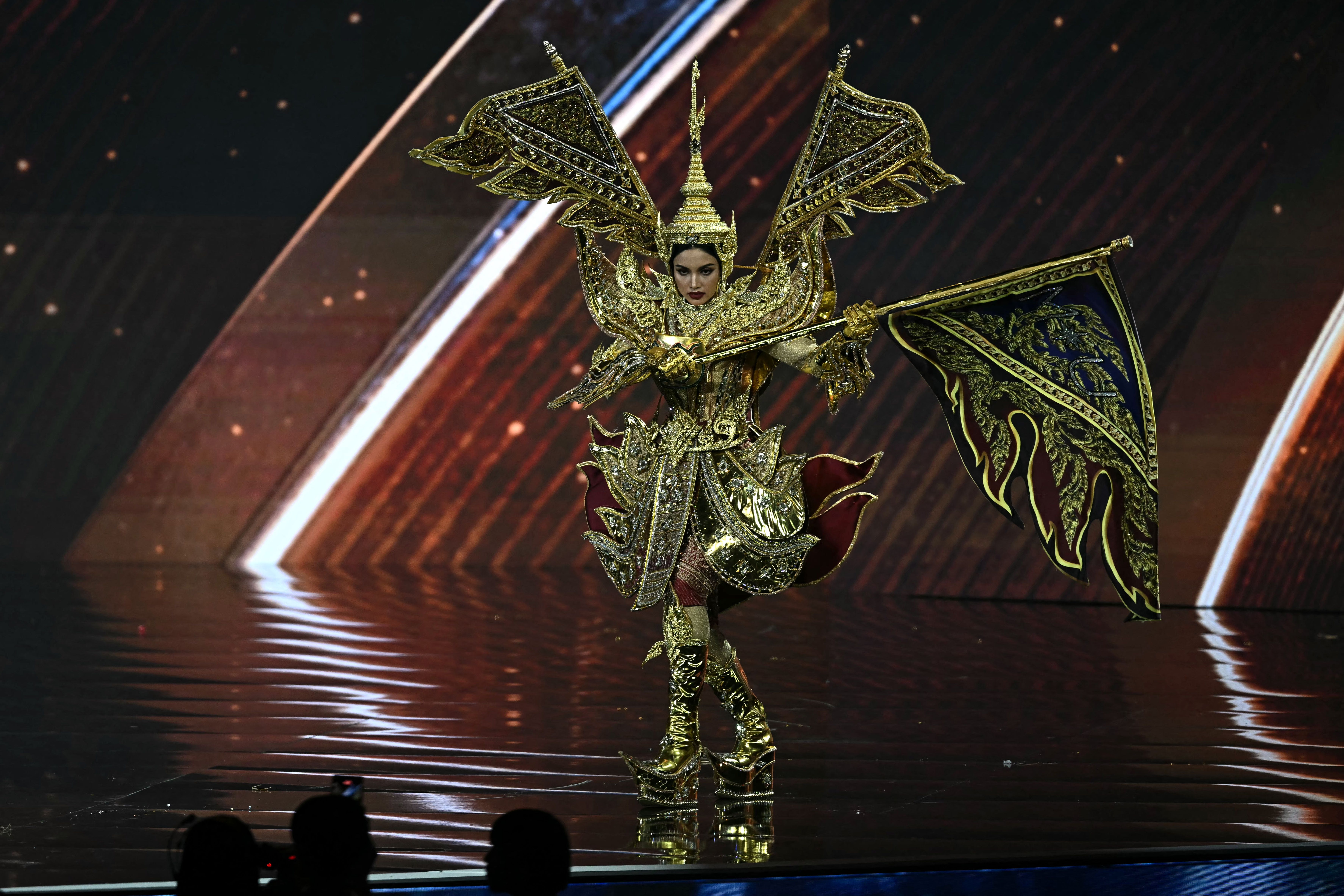
Explore more about Thailand with Thai PBS World: world.thaipbs.or.th
Special thanks: Thitipong Duangkong, Jittawat Kunyamoon and Narusiri Jaowanaridhi
Words: Peerachai Pasutan
References/อ้างอิง
- The Impact of Theme-Based Language Instruction on Language Learning Effectiveness and Motivation: A Case Study of “Spanish and Beauty Pageant Course,” Publicaciones, 52(1)
- “Introducing… the Queen,” Queen for a Day: Transformistas, Beauty Queens, and the Performance of Femininity in Venezuela (2014), Duke University Press
- “Introduction,” The Most Beautiful Girl in the World: Beauty Pageants and National Identity (1999), University of California Press
- “I want to … let my country shine”: Nationalism, development, and the geographies of beauty. Environment and Planning D: Society and Space, 38(5)
- Mayahood Through Beauty: Indian Beauty Pageants in Guatemale, Bulletin of Latin American Research, 24(3)
Miss Peru contestants accuse country of not measuring up on gender violence, The Guardian
On Beauty and Protest, Women’s Studies Quarterly, 46(1 & 2) - The Term “Global South” Is Surging. It Should Be Retired., Carnegie Endowment for International Peace
ค่านิยมทางการเมืองและสังคมในการประกวดนางงาม (Political and Social Values in Beauty Pageants), วารสารรัฐศาสตร์และรัฐประศาสนศาสตร์, 13(1) - เจาะลึกโลก “นางงาม” กับคอร์สภาษาสเปน อักษรฯ จุฬาฯ จัดครบทั้งภาษา สาระ และความสนุก, จุฬาลงกรณ์มหาวิทยาลัย
- ชื่อ “อู่ตะเภา” มาจากไหน? สู่จุดกำเนิด “สนามบินอู่ตะเภา” ฐานทัพอเมริกาใช้บอมบ์อินโดจีน, ศิลปวัฒนธรรม
- ภาพลักษณ์นางงามไทยที่สะท้อนผ่านการตอบคำถามบนเวทีมิสยูนิเวิร์สไทยแลนด์ (The Image of Thai Beauty Pageants through Miss Universe Thailand Contest’s Answers), วารสารวิชาการนิเทศสยามปริทัศน์ – Siam Communication Review, 20(2)
- อำนาจละมุน (Soft Power) ที่สะท้อนในธุรกิจกำรประกวดนางงาม : การใช้มุมมองทางสังคมและธุรกิจวิเคราะห์ผลกระทบในเชิงอำนาจละมุน (Reflection of Soft Power in the Beauty Pageant Business: A Use of Social and Business Perspectives on Soft Power Impact Analysis), วารสารเพื่อการพัฒนาการท่องเที่ยวสู่ความยั่งยืน – Journal of Sustainable Tourism Development, 5(2)



